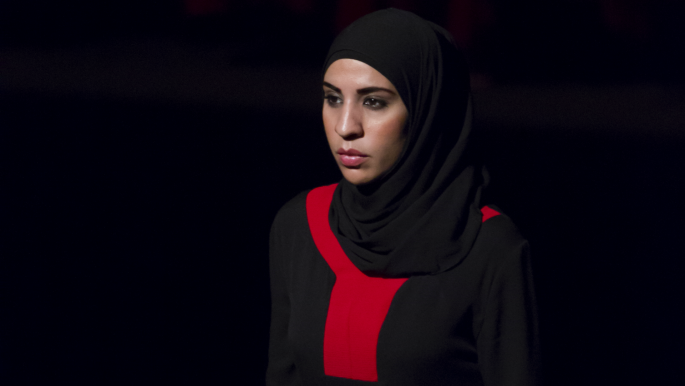
Tragedies, new and old
On 5 August 2012, clashes in Hama intensified. It was during Ramadan, and as usual there was no electricity. We broke our fast by candlelight and had our Suhur [pre-dawn Ramadan meal] to the sound of mortar shells falling.
That night was very harsh for my son Badr, who had leukaemia. He needed a blood transfusion. He was bleeding with a bluish rash covering his five-year-old body, and his fever did not drop below 41.
I couldn't do anything that night to help him. I could not
take him to the hospital because the shelling was too intense and the clashes did not subside. I sobbed, embraced
| Sometimes, I feel feeble when I remember how Antigone went all the way to the very end. I didn't. |
him, and slept by his side. It was the last night I slept by my son.
The next day the situation had not calmed, but I could not bear to watch my son suffer anymore. Despite the sniper fire and clashes, I took him to hospital. We rode with others who were fleeing the city. I arrived in the hospital but he passed away that day, 6 August 2012. Badr died along with all my dreams.
Because of the circumstances, I only had only a short time to say goodbye to my eldest son. The clashes meant the burial was quick. Only five people could attend because the snipers outside the cemetery were targeting any assembly of people they saw.
On 27 October 2012, I left my son's grave, my home, and my family, and fled to Lebanon. The area was again coming under shelling. We fled to Beirut seeking comfort and security, and did not know what lay in store for us. We ended in the impoverished and destitute environs of the Shatila refugee camp.
I first heard about the play in July. We had spent around a year and a half in the camp. I heard about it from a neighbour, who was attending a sewing course at a charity nearby. We were told there were people staging plays and they wanted to organise a project involving women from the camp. So I went.
On the way back, I decided to be involved in the play, even if for a few hours each day. I wanted to express myself. I was afraid that if I spent any more time without speaking out I would choke on my own words.
Time at the camp passes slowly and heavily. The women at the workshop came from all over Syria – Aleppo, Daraa, the Damascus countryside – and now from the Shatila camp and elsewhere. We felt the place where we rehearsed was another little world where we could escape the camp and cast off our misery, at least for a short while.
We learned more about the script. The story of Antigone gave us confidence. We felt Antigone resembled us. I became obsessed with her, her strength, and her ability to confront adversity. I felt I was sad and wounded like her. I had not forgotten the burial. To this day, my son's grave remains without a tombstone. I don’t feel like I have buried him. Sometimes, I feel feeble when I remember how Antigone went all the way to the very end. I didn't.
 |
|
| 'Our deaths like our lives will pass without a noise' (Tabitha Ross) |
In the first sessions, our voices were similar. All the stories were about where we came from, when we left, and our miserable lives in Lebanon.
But we didn't say more. We spoke collectively. We were afraid to say anything else. We were like the Chorus in Antigone.
We were all Syrians or Palestinian Syrians. We felt that we had a lot in common. Our dreams were what we had most in common. We dreamt the whole time. It was the only way to preserve the memories of homes that had been destroyed or that we had left. Many times, dreaming was our only way to forget our sorrow and be able to smile.
The play was important to us. We were leaving the camp even if for a short while every day. And in the days before the performance, I felt an ache. I was afraid to wake up from the dreams to return to the painful reality we were living.
I was afraid our stories would end when Antigone was over. I started thinking about how much we were alike. I drifted off and told myself if Antigone had not been a princess and the daughter of a king, she would not have had the strength and self-confidence.
We are not princesses. No one knows us, and no one will talk about us when we die. We are ordinary people, simple even, and our deaths like our lives will pass without a noise. We should remember this and remember the limits of our ability to make a stand.
But no, we should not be broken by displacement, poverty, and life in the camps. We should continue to defend our right to live and dream. We should continue and try to chart our lives in the way we dream them to be.





 Follow the Middle East's top stories in English at The New Arab on Google News
Follow the Middle East's top stories in English at The New Arab on Google News


